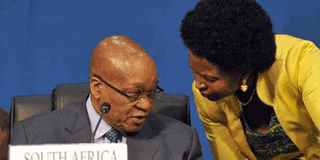Rome Statute should apply equally to all, S. African Foreign Minister tells meeting

South African President Jacob Zuma (left) and South African International Relations and Cooperation Minister of Maite Nkoana-Mashabane during the 5th BRICS summit on March 27, 2013 in Durban. South Africa’s Parliament is set to debate a motion of no confidence in President Jacob Zuma. PHOTO | ALEXANDER JOE |
What you need to know:
- South Africa has called on Western Powers to consider the need of keeping peace even as they make interventions against war crimes and crimes against humanity.
- “It is time that we ask ourselves how international law must be applied in an imperfect world, where an idealistic view that strives for justice and accountability competes with the immediate objectives of peace, security and stability,” said the minister.
- In her address at the general debate of the 14th meeting of the Assembly of State Parties of the ICC, which was held at The Hague, Netherlands, the South African foreign minister, Maite Nkoana-Mashabane, said her country is committed to defending human rights and fight against impunity.
PRETORIA, Wednesday
South Africa has called on Western Powers to consider the need of keeping peace even as they make interventions against war crimes and crimes against humanity.
While defending its decision to let Sudan President Omar al-Bashir fly out of the country in June this year, Minister of International Relations and Co-operations Maite Nkoana-Mashabane said there are some serious flaws in the interpretation of the Rome Statute of the International Criminal Court.
“It is time that we ask ourselves how international law must be applied in an imperfect world, where an idealistic view that strives for justice and accountability competes with the immediate objectives of peace, security and stability,” said the minister.
President al-Bashir is wanted by the ICC to face charges of crimes against humanity that were allegedly committed in Darfur, Sudan.
The Sudan president was allowed to attend an African Union summit in South Africa and later left for his country, causing a row between ICC and the host country.
COMMITTED
In her address at the general debate of the 14th meeting of the Assembly of State Parties of the ICC, which was held at The Hague, Netherlands, Mashabane said her country is committed to defending human rights and fight against impunity.
However, she was quick to add that the court must remain a universally accepted institution for justice as was intended when it was established.
“We will not join in the dangerous chorus of uncritical loyalty. This is our Court, and we have a responsibility to interrogate whether this institution is still reflective of the principles and values which guided its creation,” she said.
According to the minister, the Bashir row was brought about by the fact that South Africa has overlapping mandates in its efforts to contribute to maintaining peace in Africa.
She said the country was faced with “conflicting international law obligations which had to be interpreted within the realm of hard diplomatic realities”.
“Delegates will recall that in our previous statements to this meeting we have emphasised that peace and justice are two sides of the same coin: we cannot pursue one without regard to, or at the expense of, the other.
PEACE
“In complex and multi-faceted peace negotiations and sensitive post-conflict situations, peace and justice must be viewed as complementary and not mutually exclusive,” she said.
The minister told the delegation that South Africa is diplomatically involved in inter-related peace processes in the Darfur region of Sudan and in South Sudan, on a bilateral basis as well as part of other AU mandates.
She added that the Rome Statute should apply equally to cases that have the potential to implicate “great powers”, such as by opening investigations after preliminary analysis being done in Afghanistan, Iraq and Palestine.
She said delays in opening investigations in such cases are causing perceptions of inequality and unfairness in the practice of the ICC.




